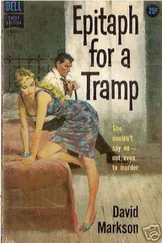James Siegel - Epitaph
Здесь есть возможность читать онлайн «James Siegel - Epitaph» весь текст электронной книги совершенно бесплатно (целиком полную версию без сокращений). В некоторых случаях можно слушать аудио, скачать через торрент в формате fb2 и присутствует краткое содержание. Жанр: Триллер, на английском языке. Описание произведения, (предисловие) а так же отзывы посетителей доступны на портале библиотеки ЛибКат.
- Название:Epitaph
- Автор:
- Жанр:
- Год:неизвестен
- ISBN:нет данных
- Рейтинг книги:4 / 5. Голосов: 1
-
Избранное:Добавить в избранное
- Отзывы:
-
Ваша оценка:
- 80
- 1
- 2
- 3
- 4
- 5
Epitaph: краткое содержание, описание и аннотация
Предлагаем к чтению аннотацию, описание, краткое содержание или предисловие (зависит от того, что написал сам автор книги «Epitaph»). Если вы не нашли необходимую информацию о книге — напишите в комментариях, мы постараемся отыскать её.
Epitaph — читать онлайн бесплатно полную книгу (весь текст) целиком
Ниже представлен текст книги, разбитый по страницам. Система сохранения места последней прочитанной страницы, позволяет с удобством читать онлайн бесплатно книгу «Epitaph», без необходимости каждый раз заново искать на чём Вы остановились. Поставьте закладку, и сможете в любой момент перейти на страницу, на которой закончили чтение.
Интервал:
Закладка:
Mr. Brickman came to see him on a Tuesday.
"I never walk out alone anymore," he said, "but in your case I made an exception."
"Thank you."
"So"-Mr. Brickman peered at him-"what transpired here?"
"I didn't look where I was going."
"Obviously. Where were you going?"
"To see a friend. Wrong house," the words springing out of him as if on their own, like trained circus animals used to pirouetting on cue.
"I'll say," Mr. Brickman said. "By the way-what friend?"
"You don't know him," William said, thinking that neither did he-know him. And also thinking that this wasn't bad at all, lying around pasha-like, chatting with friends, that it passed the time in a painless sort of way. And painless was what he was after, yessiree-just what the doctor ordered. Sometimes when he looked down at his body, at that mountain of gauze and plaster, he actually scared himself. It was like looking at his reflection in the mirror of the National Inn, only times squared. There he just looked like he was deteriorating; here he looked like he'd finished. A little like a rag doll with the stuffing all torn out. And it hurt-in between the narcotics, it hurt even to breathe.
"When are they going to let you out?"
"They keep saying when my medical condition improves. Either that, or when my Medicare condition doesn't."
"They said that?" Mr. Brickman looked appropriately shocked.
"Just kidding, Mr. Brickman." Though he wasn't, not really. Sometimes he got the feeling the doctors weren't consulting his chart so much as consulting his coverage plan. He got that feeling because they kept looking at his bed as if they were tired and wanted to sleep in it. No doubt about it, they wanted that bed. The problem was, he was still in it.
His next-door neighbor in the bed over, which in this room meant about the width of a bathroom stall, was wheezing something awful.
"Anyway," Mr. Brickman said, followed by a sigh positively dripping with insincerity, "this is the life."
"If you say so."
"Sure I do. You know, I was thinking about Eddie the other day."
"What about Eddie?"
"Nothing. Just about him. About how he's dead."
"Yeah. He's certainly dead."
"Strange thing, isn't it?"
"What?"
"Being dead."
"Yeah. It's a strange thing."
"You shouldn't think about it," Mr. Brickman said, patting his arm-or actually, his sling. "Not in your condition."
"I wasn't thinking about it."
"That's the spirit. You know, someone called. He wanted to know how you were."
But I don't know a someone, William started to say. Then stopped, feeling all of a sudden very cold, cold like death. Okay, stupid me.
"Someone," William echoed. "He wanted to know how I was. That's it?"
"That's it. I assured him you were mending."
"Was he happy about that?"
"Well, sure, I guess. Like I said, he was concerned."
"I'm sure he was. Didn't leave a number, did he?"
"Number? No. But if he calls again…"
"Sure, Mr. Brickman. If he calls again, you'll ask."
"Naturally."
Conversation withered after that, took a definite turn into small talk and then very small talk, and then talk that was just about infinitesimal. William, still thinking about his anonymous well-wisher, felt as if all those bandages that were wrapped around his body had suddenly wrapped themselves around his throat. Mr. Brickman, who wasn't exactly leading an exciting life these days as a virtual shut-in, seemed to run out of things to say. So he said goodbye.
"Thanks for coming," William said, although he wasn't altogether sure now that he was.
Fifteen minutes after Mr. Brickman left, the day nurse-a large black woman who tended to talk to him as if he were under the age of ten-gave him his daily dose of nirvana. It worked too; a minute later he was in the middle of a strange dream.
A doctor was standing over his bed. The strangest- looking doctor he'd ever seen, his pupils black as a negative of snow, that black, framed by eyebrows the color of steel. He was an old doctor to be sure, but not a kindly old doctor. He wore an air of detachment about him, as stiff and starched and antiseptic as his smock.
"For you," the doctor said, "to help you sleep." Something was in his hand-more painkiller perhaps?
"I'd like to talk," William replied. "I'd like to tell you something."
"Yes…" The doctor hesitated. "Well, why not."
"It's just this. I'm off the case. That's all. Someone tried to kill me and then he called Mr. Brickman to see if he'd finished the job. I'd like whoever it is to know that I'm off the case. That there's no hard feelings. Could you arrange that?"
"Of course. But maybe he thinks you know too much. Did you consider that?"
"Actually, I have. But you see, he's wrong there. I know very little, almost nothing."
"Ah well, in that case, maybe he'll listen. Don't you want to sleep now?"
"No. I want to talk. I told you."
"But you're in pain. Aren't you in pain?"
"Yeah, I'm in pain. But I don't want to sleep. I'm… well… afraid."
"Afraid? Afraid of what?"
"Of sleep. I'm afraid that if you put me to sleep, I won't wake up again."
"Is that so bad a thing?"
"Maybe not. But all the same…"
Then the dream turned murky, that is, murkier than dreams usually are. It seemed to him that the door opened, that the door opened or a window did, that a television was turned off or turned on, and then the doctor was gone.
End of dream. He woke up what must have been hours later with a headache and a dry mouth, a little like a hangover without the fun.
NINETEEN
They let him out one week later. By that time his burden of gauze and plaster had been reduced to two small casts on his little toe and right wrist and three fat bandages wrapped around his chest. He was given a large bottle of codeine tablets to take with him, that and a set of orders, the major one being to stay put and not walk into burnt-out houses in the middle of the night.
"Don't worry," he told the doctor, leaning on a two- pronged cane that he'd been given, or actually been made to purchase, "I have no intention of walking anywhere."
"Good boy," said the doctor.
William didn't know if he was supposed to say thank you or just wag his tail.
A car service was waiting for him in the circular driveway-courtesy of Medicare. The driver peered out at him with unmistakable distaste; one old man and one new cane meant he'd actually have to get out and help once they'd arrived wherever it is they were going. He didn't look quite as homicidal as the driver from the other night, that night, but he looked like he wouldn't mind tripping William on the way in. William sympathized- after all, it was hot.
When they arrived at their destination, Mr. Brickman was waiting, Mr. Brickman and Mr. Leonati too, so the driver was able to stay where he was, his only manual labor the handing back of change. This brightened his mood considerably, leading him to actually say something solicitous.
William thought it must be something solicitous, because of the tone-the words were in Russian or Greek or Lithuanian or maybe pig Latin. Not speaking English seemed to be the taxi driver's rule of thumb these days.
Mr. Brickman and Mr. Leonati did speak English though.
"You don't look too good," Mr. Leonati said as he helped him out of the car. "What do you think?" he asked Mr. Brickman, who'd flanked him on his other side and was already grunting from the exertion. "You think he looks good?"
"Better than when I saw him before. You should have seen him then. He looked awful."
William felt as if he was caught in the middle of a stage routine-Leonati and Brickman, Brickman and Leonati-and him, the stooge, the butt of their hilarity. What next, he wondered-a pie in the face?
Читать дальшеИнтервал:
Закладка:
Похожие книги на «Epitaph»
Представляем Вашему вниманию похожие книги на «Epitaph» списком для выбора. Мы отобрали схожую по названию и смыслу литературу в надежде предоставить читателям больше вариантов отыскать новые, интересные, ещё непрочитанные произведения.
Обсуждение, отзывы о книге «Epitaph» и просто собственные мнения читателей. Оставьте ваши комментарии, напишите, что Вы думаете о произведении, его смысле или главных героях. Укажите что конкретно понравилось, а что нет, и почему Вы так считаете.












